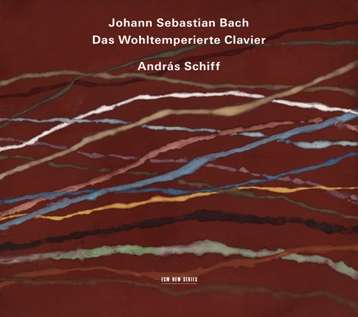|
Back
10/09/2012
Johann Sebastian Bach: The Well-Tempered Clavier, BWV 846-893
András Schiff (piano)
Recorded at Auditorio Radiotelevisione Svizzera, Lugano (August 2011) 246’23
ECM 17337-02 – Booklet in English

   
When a major artist re-tackles a major piece of the repertoire, questions are unavoidable. András Schiff's Decca recordings of The Well-Tempered Clavier have stood the test of time as reliable, middle-of-the-road interpretations. When approached with this new set on ECM, I hoped for a new perspective from the pianist, perhaps not drastically different but at least distinctive from the earlier effort. Alas, the differences are minimal and come mostly from the recorded sound. ECM provides a warmer, more detailed acoustic. The Decca set had a strange, hollow quality to it, and the piano didn't seem entirely balanced or perfectly in tune.
In addition to the slightly improved acoustics, the differences in Schiff's interpretation lie mostly in articulation. Indeed, he seems a bit more "open" to using pedal, mainly in the preludes, and this is even the subject of Schiff's booklet essay. His warning that we not "underestimate the damage that can be caused by indiscriminate use of the pedal[…]" means that nowhere in this recording do we get washes of sound or blurred counterpoint. This results in reliably clean Bach, but also makes some of the more complicated textures sound as difficult as they are to play without pedal. Even as early as Book I's C minor fugue, cadences sound a bit clumsy and, at times, chopped, all in a seeming attempt to avoid muddying things with the pedal.
Here is my confession: I like my Bach mannered, as long as it's intelligently mannered. My favorite recording of Book I is by Olli Mustonen, a reading that couldn't be more the opposite of either of Schiff's recordings, but seems to be an apposite stance on this particular piece of music. The work was written partially as a celebration of recent technical innovations in instrument building, and pianists like Mustonen seem to relish the opportunity to renew our perspective of it. It can be a maddening approach, but it is certainly memorable. In preparing to write about Schiff's current set, I found precious little that stood out as I listened. Words like "reliable", "straightforward" and "standard" peppered my notes most frequently.
To be sure, there is an admirable clarity to articulation and voicing throughout the 48 couplets, but Schiff seems frightened to commit to a point of view other than one that has been realized many times on both piano and harpsichord by equally capable musicians. Further, Schiff's view of the work has made only slim progress in the 20-odd years since he recorded it for Decca. The opening pairing presents somewhat monochromatic motor-preludes followed by intelligent fugues that verge on the pedantically voiced. Book I's D Minor prelude retains Schiff's pizzicato-esque left hand and silkily unfolding upper voice. The F Major prelude is taken at a measured pace and lacks the gigue-like bounce that makes it delectable in other hands. The A Minor fugue is tidy, lacking bite and venom.
Schiff does shine in many of the softer, more shadowy moments. Book I's culminating B minor fugue is an excellent study in sustained tension, and the more enigmatic Book II provides dashes of the spice that seem missing from Book I. The trio sonata-like textures of the F Minor prelude are poetically played, and the second book's A minor pairing, perhaps my favorite of the entire set, sees Schiff ushering in sinewy, continuous layers of sound in the prelude and dagger-like, articulate voices in the fugue, at a slightly faster tempo than in his Decca set.
This set is recommended for the listener that doesn't have Schiff's Decca recordings or another "standard" piano version of this work, since it presents a reliable interpretation, beautifully recorded. There is nothing controversial here, but nothing magical either. For those seeking new inspiration from this much-recorded work, the search will have to proceed elsewhere.
Marcus Karl Maroney
|